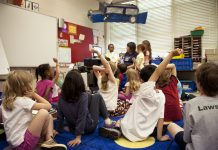We belong to an international Christian church that is very diverse. We are blessed to have people from all different nations available to help us with cultural differences in raising our children. Our Ethiopian friends worship with us as do Hispanic, Asian and people from 50 different countries. I believe the expression “it takes a village†really applies to us.
Three of my six children are adopted from Ethiopia and one is from Guatemala. My daughter from Guatemala was adopted as an infant. My children from Ethiopia were adopted just three years ago at the ages of five, six and nine. I had assumed that because they were all together that it would be difficult for them to totally lose the memory of their native language, Amharic. I have Amharic-speaking friends nearby that my kids see about once a week. When they first came home from Ethiopia, we would call our friends frequently to translate.
After about a year and a half, we realized the younger two children had forgotten their native tongue. A newly adopted friend of my middle daughter Ella’s, from her orphanage, had recently come to America and wanted to speak with her. Ella grabbed the phone and tried to speak and handed the phone back to me proclaiming with shock and concern, “My mouth is not working for Amharic!†We have brought them to concerts here with Amharic songs. We frequent Ethiopian restaurants and have Ethiopian friends. Still it was clear that in our attempt to help the kids learn English (along with assimilating to their new American lifestyle), that the children lost the ability to carry on conversational Amharic.
When you adopt children from another country, how important is it that they learn or maintain their native language? I think it all depends on the child. Of course it is also important if maintaining a connection to the child’s culture is important to you. Although I would love my Guatemalan daughter to be fluent in Spanish, at the age of 5, she currently has no interest. She had been in a Spanish immersion preschool prior to starting kindergarten but now after a year of public school she doesn’t remember or speak any Spanish. I speak conversational Spanish and am reintroducing Spanish to my little Guatemalan daughter, Matea, in pieces. She is not very interested but I believe if she understands some basic phrases, in time she will also once again embrace her native language.
Our oldest Ethiopian daughter is now caught up in her schooling. In only three years of formal schooling, our daughter Grace is now on the honor roll in 6th grade and is a member of the Spanish club. She now also wants to brush up and become re-acclimated to her native Amharic. We are committed to following her lead in helping her to become fluent again. To this end, we have scheduled weekly conference calls with our Amharic-speaking Ethiopian friends. We also follow online tutorials on youtube and other language sites and conduct written classes with our friends who have volunteered their time.
At the age of 12, Grace has proclaimed that she wants to be a translator when she grows up and she is on her way. Her ESL (English as a Second Language) teacher is encouraging her to continue to work on English and return now to brushing up on her native tongue. She also meets once a week to learn basic Spanish. I was very worried about all of this information and language confusing Grace, but her teacher has told me that Grace is very fast with learning these languages (an advantage learned from being immersed in English) and will do fine while simultaneously learning three languages. The other advantage to Grace learning languages is that as an orphan, Grace had hearing loss due to her constant, untreated ear infections. In developing her recognition of different languages by concentrating on the nuances of the spoken word, Grace’s hearing has also improved.
My entire family is benefiting as a result of Grace’s newfound interest in reclaiming her language. We are all using some Amharic commands and we believe that the younger ones will all be encouraged as they grow to take on a second language. My oldest daughter is 19 and will be an exchange student in Paris this summer. Grace is interested in learning French as well. I have told her to slow down a bit and for now focus on English, Amharic and Spanish.
Without our church community and friends, we wouldn’t be able to have access to conversational Amharic to help Grace. As parents to children from three different countries we feel we have a responsibility to educate them in their new home of America but we also don’t want to rob our children of who they are by erasing the memories of their culture which includes their language. It is a process but even a few key phrases rekindled in their memories are considered little treasures to them. And we are happy we have been able to contribute to adding to their cultural treasure chest.


































